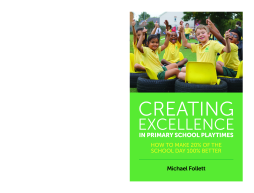
Additional Information
Book Details
Abstract
School playtimes account for 20% of a child's school life, but how can schools ensure that this time is as beneficial as possible for primary school pupils? Emphasising the importance of play in child development, this book identifies the key challenges facing schools during break times and sets out a complete strategy for effectively managing playtimes that are fun-filled and offer children greater long-term benefits.
With before and after case studies showing how school playtimes have been transformed through the author's OPAL Primary Programme, this book demonstrates how to improve common issues such as behaviour, staffing, space and facilities in a sustainable way that capitalises on investments in equipment and training. Promoting wellbeing and healthy child development, this book provides inspiring reading for primary school staff and play workers, and creative ideas and ready-to-use solutions that will help schools to meet Ofsted criteria for excellent play.
Michael Follett is founder of OPAL (Outdoor Play and Learning) which delivers training and consultancy on play in schools, play equipment and landscapes development, and development of play policy.
Table of Contents
| Section Title | Page | Action | Price |
|---|---|---|---|
| Creating Excellence in Primary School Playtimes: How to make 20% of the school day 100% better by Michael Follett | 3 | ||
| Introduction | 7 | ||
| PART I: Background, Theory and School Culture | 13 | ||
| 1. What Is Play and Why Is It Important? | 15 | ||
| 2. Where Has Play Gone and Why? | 25 | ||
| 3. Why Should Schools Improve Play? | 31 | ||
| 4. The Limitations of Existing Solutions | 40 | ||
| 5. What Works? | 50 | ||
| 6. Leadership and the Culture of Play | 53 | ||
| 7. Managing Risk | 61 | ||
| 8. Values and Policy | 71 | ||
| 9. Supervision: From Policing to Playwork | 82 | ||
| 10. Equality | 91 | ||
| Use it!: Site Access and All-Season Use | 95 | ||
| PART II: The Environment of Play Design Theory | 105 | ||
| 12. Creating a Landscape for Play in a School | 106 | ||
| 13. Social Space | 111 | ||
| 14. Journey | 117 | ||
| 15. Affordance, Difference and Material Richness | 122 | ||
| 16. Change | 126 | ||
| Conclusion | 133 | ||
| Notes | 136 | ||
| Index | 138 | ||
| Blank Page |
